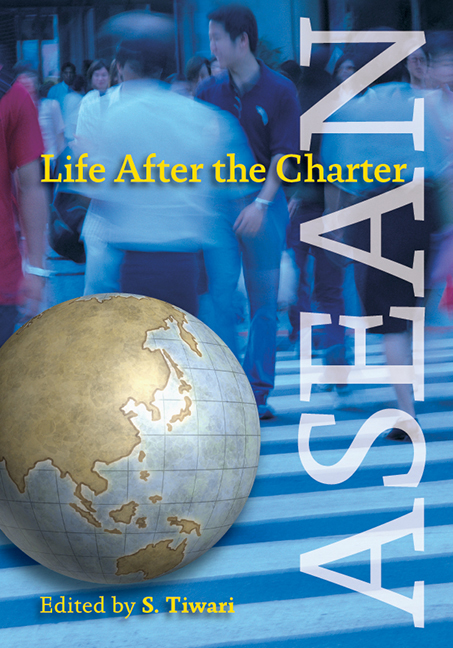Book contents
- Frontmatter
- Contents
- Foreword
- Preface
- List of Contributors
- Introduction
- 1 ASEAN Legal Personality under Its New Charter – Its Nature, Meaning and Implications: Status of the Work and Issues Involved
- 2 Does ASEAN Exist? The Association of Southeast Asian Nations as an International Legal Person
- 3 Life in ASEAN After the Entry into Force of the ASEAN Charter: Implications and Follow-ups
- 4 Translating the Design into a Bloc: The Domestic Implementation of the ASEAN Charter
- 5 ASEAN Trade in Goods Agreement (ATIGA)
- 6 The ASEAN Comprehensive Investment Agreement 2009: Its Objectives, Plans and Progress
- PRIVATE SECTOR PERSPECTIVES
- 7 The ASEAN Charter and the ASEAN Economic Community: A Watershed for Regional Economic Integration?
- 8 Implications of an Uncertain Global Economy on Integration Initiatives
- 9 Challenges to Achieving the ASEAN Economic Community
- 10 ASEAN: An Integrated Market?
- 11 A Miscellany of Trade Issues
- 12 Policy Issues for ASEAN Countries
- Index
7 - The ASEAN Charter and the ASEAN Economic Community: A Watershed for Regional Economic Integration?
from PRIVATE SECTOR PERSPECTIVES
Published online by Cambridge University Press: 21 October 2015
- Frontmatter
- Contents
- Foreword
- Preface
- List of Contributors
- Introduction
- 1 ASEAN Legal Personality under Its New Charter – Its Nature, Meaning and Implications: Status of the Work and Issues Involved
- 2 Does ASEAN Exist? The Association of Southeast Asian Nations as an International Legal Person
- 3 Life in ASEAN After the Entry into Force of the ASEAN Charter: Implications and Follow-ups
- 4 Translating the Design into a Bloc: The Domestic Implementation of the ASEAN Charter
- 5 ASEAN Trade in Goods Agreement (ATIGA)
- 6 The ASEAN Comprehensive Investment Agreement 2009: Its Objectives, Plans and Progress
- PRIVATE SECTOR PERSPECTIVES
- 7 The ASEAN Charter and the ASEAN Economic Community: A Watershed for Regional Economic Integration?
- 8 Implications of an Uncertain Global Economy on Integration Initiatives
- 9 Challenges to Achieving the ASEAN Economic Community
- 10 ASEAN: An Integrated Market?
- 11 A Miscellany of Trade Issues
- 12 Policy Issues for ASEAN Countries
- Index
Summary
ASEAN is armed with a new “charter”. The ASEAN Charter gives the group a common legal personality; it contains (minor) institutional innovations; and it houses an ASEAN Political-Security Community, an ASEAN Sociocultural Community and, not least, the pre-existing ASEAN Economic Community (AEC). On the economic front, the Charter contains two new agreements, the ASEAN Trade in Goods Agreement (ATIGA) and the ASEAN Comprehensive Investment Agreement (ACIA). These integrate separate agreements into single consolidated legal texts on trade in goods and foreign direct investment respectively. The ASEAN Framework Agreement on Services (AFAS) remains unchanged.
What are we to make of the new-look ASEAN? Outsiders have long belittled ASEAN for its internal divisions and lack of integration. ASEAN rhetoricians counter that with its brand-new Charter, its AEC Blueprint, and indeed its new free trade agreements (FTAs), ASEAN has reached a watershed. In future it will spur intra-regional integration, be a viable collective force in wider Asian and international relations, and collectively counter common challenges – not least the present global economic crisis.
I remain a sceptical outsider. My preference is to take a cool, hard look at the ASEAN economic track record and the real forces driving regional economic integration. I do not take ASEAN rhetoric at face value, nor do I confine myself to legal microdetails. The job of the economist, especially one with a strong applied interest in policies and institutions, is to survey the forest, not to rhapsodize its sylvan beauty, nor to microscopically examine its trees in splendid isolation.
Do not get me wrong. ASEAN is better than nothing. It is good for politicians and officials to meet regularly and jaw-jaw. In a region historically riven by conflict and violence, that is better than the alternative. If member governments can agree on modest common denominators, so much the better. Beyond serving as a marginally useful chat forum, does ASEAN, as an economic entity, have substance? Will the Charter and the AEC make a difference? Let's start with the ASEAN track record, and then move on to the Charter.
- Type
- Chapter
- Information
- ASEANLife after the Charter, pp. 113 - 123Publisher: ISEAS–Yusof Ishak InstitutePrint publication year: 2010



